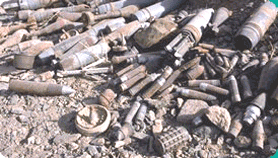Explosive remnants of war such as abandoned and unexploded ordnance as well
as failed cluster submunitions, put innocent lives and livelihoods at risk long
after conflict has ended. Unlike landmines, there is currently no provision
in international law which addresses the problem of cluster munitions and other
ERW and the devastating effect they have on civilian populations.
There are at least 92 countries contaminated by unexploded cluster submunitions
and other explosive remnants of war in every region of the world. There is on-going
conflict in some of these countries but in many cases ERW is from a decade or
more ago.There is also a further significant group of countries that have a
residual ERW problem, usually from the First and Second World Wars.
This is our problem, not their problem.
ERW casualties
Between January 2001 and May 2002 new casualties were reported in 57 countries:
fifteen countries in sub-Saharan Africa, 17 in Europe and Central Asia, 14 in
the Middle East and North Africa, six in Asia and five in the Americas.
Socio-economic impact
There is also a significant negative socio-economic impact. Cluster munitions
and other ERW compounds development problems and affected communities by modifying
their social and economic patterns.1. The presence of cluster munitions and
other ERW prevents the use and rehabilitation of community infrastructure and
resources, including housing, water and irrigation systems, villages, schools,
places of worship, and the paths and roads between them.2. Cluster munitions
and other ERW deters people from certain types of land use, or makes use of
local resources less efficient – affecting economic productivity, and
traditional social and economic practices.3. Most affected communities are in
the developing world so they are dealing with cluster munitions and other ERW
from very limited resources.4. Cluster munitions and other ERW may have a value
as a resource, e.g. as scrap metal, so people undertake high risk activities
for economic survival that may result in death or injury.



















